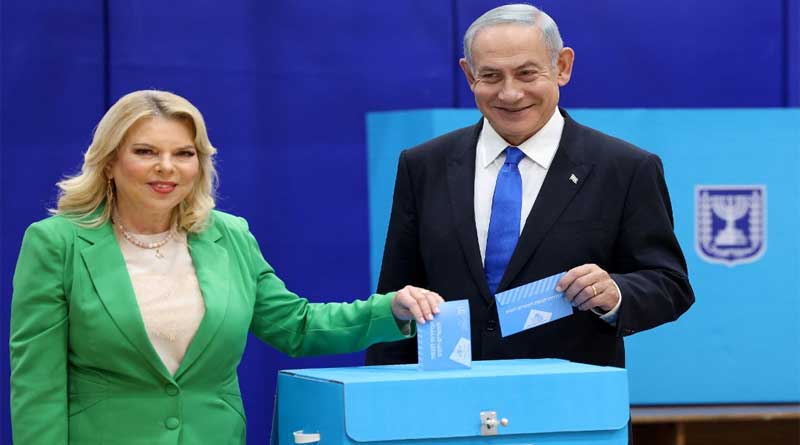Benjamin Netanyahu seeks comeback as Israel votes
Final polls on Friday indicated that Israel’s right-wing former Prime Minister Benjamin Netanyahu could come just one seat short of an outright majority in his push to return to power.
Israelis return to the polls on Tuesday for their fifth election in less than four years.
The country has been locked in an unprecedented period of political stalemate since 2019, when its longest-serving leader was charged with bribery, fraud and breach of trust, which he denies.
Mr Netanyahu was forced from office in mid-2021, when the centrist politician Yair Lapid pulled together a surprising coalition with liberal, right-wing and Arab parties united by their opposition to him.
The government outlasted the expectations of many, but finally collapsed in June.
Mr Lapid is now caretaker prime minister and Mr Netanyahu’s main competitor as he bids for a record sixth term in office.
What gives the ex-PM a boost in this vote is a deal between Likud and the far-right party, Religious Zionism, which has seen a sharp rise in popularity.
Its leaders, Itamar Ben-Gvir and Bezalel Smotrich, are outspoken Jewish supremacists. The former was also a follower of the late, explicitly racist, ultra-nationalist Meir Kahane, whose organisation was classed as a terrorist group by the US state department.
If they succeed in forming a new coalition government, it could prove a challenge for Israel’s international allies.
But among shoppers in the market, there is plenty of support for such a line-up.
“Other countries – in Europe, America – they think mainly from an economic perspective,” Tehila, a mother with a pushchair, tells me. “We need a prime minister who’s able to stand up for our security. I think Netanyahu is that someone.”
Yonathan backs Religious Zionism and feels optimistic about this vote.
“There’s less division on the right this time,” he says, noting that the left-wing Meretz party and the fractured Arab parties are in danger of failing to cross the electoral threshold.
“My hope is that they don’t pass, and the right wing might actually manage to make a stable government.”
‘Yes’ or ‘no’
Several polls by Israel’s main TV channels released at the end of last week indicated that the Netanyahu bloc – which also includes ultra-Orthodox Jewish parties Shas and United Torah Judaism – would win 60 of parliament’s 120 seats.
They predicted the rival, anti-Netanyahu bloc getting 56 seats and the Arab-led Hadash-Taal alliance, which has ruled out joining a coalition, taking four.
In the run-up to this election, the goal of Yair Lapid – leader of what looks set to be the second biggest party, Yesh Atid (There is a Future), has been to look prime ministerial.
Read This: FBI Cites ‘Evidence Of Obstruction’ In Donald Trump Florida Home Search
FBI, Donald Trump
During his past four months in office, commentators generally agree he has avoided missteps while hosting US President Joe Biden, overseeing a three-day bombardment of Islamic Jihad militants in Gaza, and signing a maritime border deal with neighbouring Lebanon, an enemy state.
“I’m voting for Lapid because I’ve liked what he’s done up until now,” says Etty, another shopper in Mahane Yehuda. “He should stay as prime minister. We have to give him a chance because Netanyahu [had] 12 years and he didn’t do anything.”
As with the previous four inconclusive elections, this looks like a referendum on Mr Netanyahu rather than a vote on Israel’s top security and diplomacy issues, notably Iran’s nuclear ambitions and the conflict with the Palestinians.
That is despite an increase in deadly violence in the occupied West Bank ahead of election day.
Last week, Israel killed three leaders of a new Palestinian armed group in Nablus known as the Lion’s Den. On Saturday, a Palestinian gunman killed an Israeli in the Jewish settlement where Mr Ben-Gvir lives, before being shot dead by a guard.
“The traditional divide between left and right, that used to be about the Palestinian issue, it’s simply been suspended because of the fight between the ‘Yes’ or ‘No Bibi’ camps,” says Tal Shalev, chief political correspondent for Walla! News.
She notes that the current opposition leader appears to be in the strongest position going into this poll.
“Netanyahu is in a much better situation just mathematically than Lapid – his centre-left bloc is just much more divided,” she says. “What will voter turnout be? That’s the million-dollar question.”
Allies watching
So far, with so much at stake, overall turnout remained relatively high at 67.4% in 2021. However, voting among Israeli Arabs, or Palestinian citizens of Israel, who account for about a fifth of the population, was only 44.6% last year.
The prospect of Mr Ben-Gvir entering government – when he has previously called for expelling “disloyal” Arab citizens – is expected to push that up only slightly for this vote.
Critics of Mr Netanyahu raise concerns that if his bloc wins, the inclusion of ultra-nationalists in a new cabinet could strain ties with Western countries and Arab countries with which Israel has new relations, as well as the Palestinians.
They also fear it will put pressure on Israel’s legal system to prevent a conviction of Mr Netanyahu.
With voting so tight, the final result of the latest vote is unlikely to be clear immediately.
And after the experience of recent years, few Israeli analysts are ready to rule out the prospect of another deadlock, which could mean Israel going to the polls once again.

